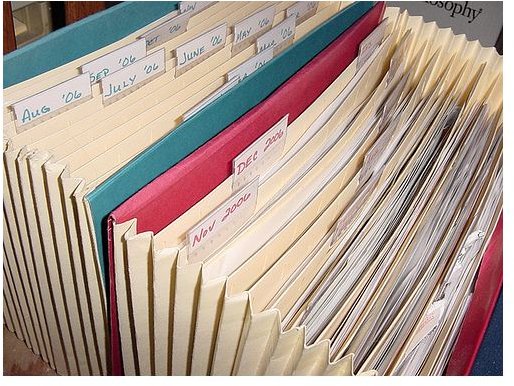Ways to Recycle File Folders
100 Million Tons Annually
The United States alone consumes almost 100 million tons of paper products each year. When you consider that it takes three tons of wood products to produce a single ton of paper, not to mention the water used and carbon dioxide emitted during production, throwing away something as simple as a file folder takes on a whole new meaning. File folders and other paper office supplies are intended for temporary use. However, many of these paper products can be recycled or reused to extend their life, reduce production of new items, or serve a new purpose other than piling up landfills.
Home Recycling and Reusing
If you are one of the many American households without access to curbside recycling programs, there are still options for recycling your old, used file folders. You can take advantage of community recycling centers or organize your own household recycling. Get together with your neighbors to start your own recycling program in your neighborhood. All that is needed are bins for various items (paper, plastic, metal, etc.) and options for collection. Your local phone book should have a plethora of recycling collection options. In short, you will either need to find a recycling center and transport your used file folders and other recyclables or contract with a commercial recycling collection company to have your items picked up regularly.
If you don’t have the time or interest in setting up a home or community-based recycling program, there are ways to recycle file folders or re-purpose and reuse them that are simple and easy. For example, shredded paper makes excellent bedding or cage lining for small animals. Likewise, shredded paper, even heavy paper like file folders, can be used to help absorb moisture and orders from trashcans and compost bins. Other ideas include:
- Use scrap computer paper and old file folders (along with a little hot glue) to make notepads for grocery or to-do lists or doodle pads for children.
- Tape or staple the open sides of used file folders and use as “grab bags” for helping children keep track of small toy pieces like Legos, or to deposit lone toy parts found around the house.
- Use old file folders to make creative, attractive gift tags. The heavier weight of the card stock is perfect for such uses.
- Composting is a great way to recycle or reuse file folders. Shred them first to speed the process and beware of harmful dyes, plastic tabs, or metal rods that are inappropriate for composting.
Office and Business Recycling and Reusing
In a business environment, the sheer volume of paper products can often inhibit small-scale efforts to recycle and reuse file folders and other used office supplies. The use of labels prolongs the life of file folders, allowing them to be reused numerous times by simply placing new labels over old. Additionally, reversing file folders (turning them inside out) can also prolong their use.
Other ways to recycle file folders or find ways to reuse them at the office include:
- Office exchange programs allow employees to deposit still-usable office supplies in a centralized location in exchange for other items they need. For example, employees can deposit excess rubber bands, clips, file folders or other supplies in exchange for pens, pencils, or printer paper. This helps ensure all supplies are used fully.
- Commercial recycling companies often provide recycle bins for various office supplies that are then picked up by a collection company.
- Donate used, non-food-soiled file folders and other supplies to local schools, daycare, senior, or community centers for art projects and other crafts.
Finding ways to recycle file folders, reuse them, or prolong their useful life does not have to be complicated or expensive. With a little creativity, you can save trees and the environment by prolonging the life of file folders and other paper products.
References
photo by: PAM (CC/flickr) https://www.flickr.com/photos/crazyneighborlady/411869140/
EPA Municiple Solid Waste Information: https://www.epa.gov/epawaste/nonhaz/municipal/pubs/msw2008rpt.pdf
Paper Facts from Cleveland State University: https://urban.csuohio.edu/~sanda/syl/envpol/materials/GREEN%20FACTS.pdf
